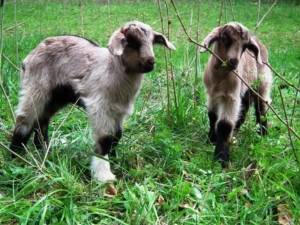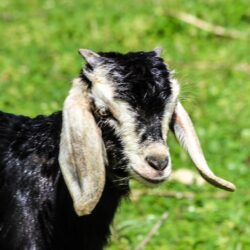Esperanto as a language has a long Jewish history. Developed by the proudly Jewish L.L. Zamenhof, its utopian vision of a world of free cultural interchange has always been popular among Jews. In fact, the phonology of Esperanto bears many similarities to Yiddish. Thus, Isaac Gantwerk Mayer has developed a system of writing Esperanto in a largely Yiddish-based Hebrew script (PDF | ODT), into which this poem has been transcribed.
| Source (Aramaic) | Translation (Esperanto) | Translation (hebraicized Esperanto) | Translation (English) |
|---|---|---|---|
חַד גַּדְיָא, חַד גַּדְיָא. דְּזַבִּן אַבָּא בִּתְרֵי זוּזֵי, חַד גַּדְיָא, חַד גַּדְיָא. |
Unu kaprido, unu kaprid’, kiun mia patro aĉetis kontraŭ du zuzoj; unu kaprido, unu kaprid’. |
אונו קאַפּרידאָ, אונו קאַפּריד׳, קיון מיאַ פּאַטראָ אַצﬞעטיס קאָנטרװַ דו זוזױ; אונו קאַפּרידאָ, אונו קאַפּריד׳׃ |
One little goat, one little goat that my father bought for two zuzim. One little goat, one little goat. |
וְאָתָא שֻׁנְרָא וְאָכְלָה לְגַדְיָא, דְּזַבִּן אַבָּא בִּתְרֵי זוּזֵי, חַד גַּדְיָא, חַד גַּדְיָא. |
Kaj kato venis kaj formanĝis la kapridon, kiun mia patro aĉetis kontraŭ du zuzoj; unu kaprido, unu kaprid’. |
קײַ קאַטאָ בﬞעניס קײַ פﬞאָרמאַנגﬞיס לאַ קאַפּרידאָן, קיון מיאַ פּאַטראָ אַצﬞעטיס קאָנטרװַ דו זוזױ; אונו קאַפּרידאָ, אונו קאַפּריד׳׃ |
A cat came and ate the goat that my father bought for two zuzim. One little goat, one little goat. |
וְאָתָא כַּלְבָּא וְנָשַׁךְ לְשֻׁנְרָא, דְּאָכְלָה לְגַדְיָא, דְּזַבִּן אַבָּא בִּתְרֵי זוּזֵי, חַד גַּדְיָא, חַד גַּדְיָא. |
Kaj hundo venis kaj mordis la katon, kiu formanĝis la kapridon, kiun mia patro aĉetis kontraŭ du zuzoj; unu kaprido, unu kaprid’. |
קײַ הונדאָ בﬞעניס קײַ מאָרדיס לאַ קאַטאָן, קיו פﬞאָרמאַנגﬞיס לאַ קאַפּרידאָן, קיון מיאַ פּאַטראָ אַצﬞעטיס קאָנטרװַ דו זוזױ; אונו קאַפּרידאָ, אונו קאַפּריד׳׃ |
A dog came and bit the cat that ate the goat that my father bought for two zuzim. One little goat, one little goat. |
וְאָתָא חֻטְרָא וְהִכָּה לְכַלְבָּא, דְּנָשַׁךְ לְשֻׁנְרָא, דְּאָכְלָה לְגַדְיָא, דְּזַבִּן אַבָּא בִּתְרֵי זוּזֵי, חַד גַּדְיָא, חַד גַּדְיָא. |
Kaj bastono venis kaj bategis la hundon, kiu mordis la katon, kiu formanĝis la kapridon, kiun mia patro aĉetis kontraŭ du zuzoj; unu kaprido, unu kaprid’. |
קײַ בּאַסטאָנאָ בﬞעניס קײַ בּאַטעגיס לאַ הונדאָן, קיו מאָרדיס לאַ קאַטאָן, קיו פﬞאָרמאַנגﬞיס לאַ קאַפּרידאָן, קיון מיאַ פּאַטראָ אַצﬞעטיס קאָנטרװַ דו זוזױ; אונו קאַפּרידאָ, אונו קאַפּריד׳׃ |
A stick came and hit the dog that bit the cat that ate the goat that my father bought for two zuzim. One little goat, one little goat. |
וְאָתָא נוּרָא וְשָׂרַף לְחֻטְרָא, דְּהִכָּה לְכַלְבָּא, דְּנָשַׁךְ לְשֻׁנְרָא, דְּאָכְלָה לְגַדְיָא, דְּזַבִּן אַבָּא בִּתְרֵי זוּזֵי, חַד גַּדְיָא, חַד גַּדְיָא. |
Kaj fajro venis kaj bruligis la bastonon, kiu bategis la hundon, kiu mordis la katon, kiu formanĝis la kapridon, kiun mia patro aĉetis kontraŭ du zuzoj; unu kaprido, unu kaprid’. |
קײַ פﬞײַראָ בﬞעניס קײַ בּרוליגיס לאַ בּאַסטאָנאָן, קיו בּאַטעגיס לאַ הונדאָן, קיו מאָרדיס לאַ קאַטאָן, קיו פﬞאָרמאַנגﬞיס לאַ קאַפּרידאָן, קיון מיאַ פּאַטראָ אַצﬞעטיס קאָנטרװַ דו זוזױ; אונו קאַפּרידאָ, אונו קאַפּריד׳׃ |
A fire came and burned the stick that hit the dog that bit the cat that ate the goat that my father bought for two zuzim. One little goat, one little goat. |
וְאָתָא מַיָּא וְכָבָה לְנוּרָא, דְּשָׂרַף לְחֻטְרָא, דְּהִכָּה לְכַלְבָּא, דְּנָשַׁךְ לְשֻׁנְרָא, דְּאָכְלָה לְגַדְיָא, דְּזַבִּן אַבָּא בִּתְרֵי זוּזֵי, חַד גַּדְיָא, חַד גַּדְיָא. |
Kaj akvo venis kaj estingis la fajron, kiu bruligis la bastonon, kiu bategis la hundon, kiu mordis la katon, kiu formanĝis la kapridon, kiun mia patro aĉetis kontraŭ du zuzoj; unu kaprido, unu kaprid’. |
קײַ אַקבﬞאָ בﬞעניס, קײַ עסטינגיס לאַ פﬞײַראָן, קיו בּרוליגיס לאַ בּאַסטאָנאָן, קיו בּאַטעגיס לאַ הונדאָן, קיו מאָרדיס לאַ קאַטאָן, קיו פﬞאָרמאַנגﬞיס לאַ קאַפּרידאָן, קיון מיאַ פּאַטראָ אַצﬞעטיס קאָנטרװַ דו זוזױ; אונו קאַפּרידאָ, אונו קאַפּריד׳׃ |
Water came and put out the fire that burned the stick that hit the dog that bit the cat that ate the goat that my father bought for two zuzim. One little goat, one little goat. |
וְאָתָא תּוֹרָא וְשָׁתָא לְמַיָּא, דְּכָבָה לְנוּרָא, דְּשָׂרַף לְחֻטְרָא, דְּהִכָּה לְכַלְבָּא, דְּנָשַׁךְ לְשֻׁנְרָא, דְּאָכְלָה לְגַדְיָא, דְּזַבִּן אַבָּא בִּתְרֵי זוּזֵי, חַד גַּדְיָא, חַד גַּדְיָא. |
Kaj bovo venis kaj trinkis la akvon, kiu estingis la fajron, kiu bruligis la bastonon, kiu bategis la hundon, kiu mordis la katon, kiu formanĝis la kapridon, kiun mia patro aĉetis kontraŭ du zuzoj; unu kaprido, unu kaprid’. |
קײַ בּאָבﬞאָ בﬞעניס, קײַ טרינקיס לאַ אַקבﬞאָן, קיו עסטינגיס לאַ פﬞײַראָן, קיו בּרוליגיס לאַ בּאַסטאָנאָן, קיו בּאַטעגיס לאַ הונדאָן, קיו מאָרדיס לאַ קאַטאָן, קיו פﬞאָרמאַנגﬞיס לאַ קאַפּרידאָן, קיון מיאַ פּאַטראָ אַצﬞעטיס קאָנטרװַ דו זוזױ; אונו קאַפּרידאָ, אונו קאַפּריד׳׃ |
An ox came and drank the water that put out the fire that burned the stick that hit the dog that bit the cat that ate the goat that my father bought for two zuzim. One little goat, one little goat. |
וְאָתָא הַשּׁוֹחֵט וְשָׁחַט לְתוֹרָא, דְּשָׁתָא לְמַיָּא, דְּכָבָה לְנוּרָא, דְּשָׂרַף לְחֻטְרָא, דְּהִכָּה לְכַלְבָּא, דְּנָשַׁךְ לְשֻׁנְרָא, דְּאָכְלָה לְגַדְיָא, דְּזַבִּן אַבָּא בִּתְרֵי זוּזֵי, חַד גַּדְיָא, חַד גַּדְיָא. |
Kaj la buĉisto venis kaj mortigis la bovon, kiu trinkis la akvon, kiu estingis la fajron, kiu bruligis la bastonon, kiu bategis la hundon, kiu mordis la katon, kiu formanĝis la kapridon, kiun mia patro aĉetis kontraŭ du zuzoj; unu kaprido, unu kaprid’. |
קײַ לאַ בּוצﬞיסטאָ בﬞעניס, קײַ מאָרטיגיס לאַ בּאָבﬞאָן, קיו טרינקיס לאַ אַקבﬞאָן, קיו עסטינגיס לאַ פﬞײַראָן, קיו בּרוליגיס לאַ בּאַסטאָנאָן, קיו בּאַטעגיס לאַ הונדאָן, קיו מאָרדיס לאַ קאַטאָן, קיו פﬞאָרמאַנגﬞיס לאַ קאַפּרידאָן, קיון מיאַ פּאַטראָ אַצﬞעטיס קאָנטרװַ דו זוזױ; אונו קאַפּרידאָ, אונו קאַפּריד׳׃ |
A butcher came and slaughtered the ox that drank the water that put out the fire that burned the stick that hit the dog that bit the cat that ate the goat that my father bought for two zuzim. One little goat, one little goat. |
וְאָתָא מַלְאַךְ־הַמָּ֫וֶת דְּשָׁחַט לְשׁוֹחֵט, דְּשָׁחַט לְתוֹרָא, דְּשָׁתָא לְמַיָּא, דְּכָבָה לְנוּרָא, דְּשָׂרַף לְחֻטְרָא, דְּהִכָּה לְכַלְבָּא, דְּנָשַׁךְ לְשֻׁנְרָא, דְּאָכְלָה לְגַדְיָא, דְּזַבִּן אַבָּא בִּתְרֵי זוּזֵי, חַד גַּדְיָא, חַד גַּדְיָא. |
Kaj la anĝelo de la morto venis kaj mortigis la buĉiston, kiu mortigis la bovon, kiu trinkis la akvon, kiu estingis la fajron, kiu bruligis la bastonon, kiu bategis la hundon, kiu mordis la katon, kiu formanĝis la kapridon, kiun mia patro aĉetis kontraŭ du zuzoj; unu kaprido, unu kaprid’. |
קײַ לאַ אַנגﬞעלאָ דע לאַ מאָרטאָ בﬞעניס, קײַ מאָרטיגיס לאַ בּוצﬞיסטאָן, קיו מאָרטיגיס לאַ בּאָבﬞאָן, קיו טרינקיס לאַ אַקבﬞאָן, קיו עסטינגיס לאַ פﬞײַראָן, קיו בּרוליגיס לאַ בּאַסטאָנאָן, קיו בּאַטעגיס לאַ הונדאָן, קיו מאָרדיס לאַ קאַטאָן, קיו פﬞאָרמאַנגﬞיס לאַ קאַפּרידאָן, קיון מיאַ פּאַטראָ אַצﬞעטיס קאָנטרװַ דו זוזױ; אונו קאַפּרידאָ, אונו קאַפּריד׳׃ |
The Angel of Death came and slaughtered the shoḥet who slaughtered the ox that drank the water that put out the fire that burned the stick that hit the dog that bit the cat that ate the goat that my father bought for two zuzim. One little goat, one little goat. |
וְאָתָא הַקָּדוֹשׁ־בָּרוּךְ־הוּא וְשָׁחַט לְמַלְאַךְ־הַמָּ֫וֶת וְשָׁחַט לְשׁוֹחֵט, דְּשָׁחַט לְתוֹרָא, דְּשָׁתָא לְמַיָּא, דְּכָבָה לְנוּרָא, דְּשָׂרַף לְחֻטְרָא, דְּהִכָּה לְכַלְבָּא, דְּנָשַׁךְ לְשֻׁנְרָא, דְּאָכְלָה לְגַדְיָא, דְּזַבִּן אַבָּא בִּתְרֵי זוּזֵי, חַד גַּדְיָא, חַד גַּדְיָא. |
Kaj la Plej Sankta, Benata estu Li, venis, kaj mortigis la anĝelon de la morto, kiu mortigis la buĉiston, kiu mortigis la bovon, kiu trinkis la akvon, kiu estingis la fajron, kiu bruligis la bastonon, kiu bategis la hundon, kiu mordis la katon, kiu formanĝis la kapridon, kiun mia patro aĉetis kontraŭ du zuzoj; unu kaprido, unu kaprid’. |
קײַ לאַ פּלײֵ סאַנקטאַ, בענאַטַא עסטו לי, בﬞעניס, קיו מאָרטיגיס לאַ אַנגﬞעלאָן דע לאַ מאָרטאָ, קיו מאָרטיגיס לאַ בּוצﬞיסטאָן, קיו מאָרטיגיס לאַ בּאָבﬞאָן, קיו טרינקיס לאַ אַקבﬞאָן, קיו עסטינגיס לאַ פﬞײַראָן, קיו בּרוליגיס לאַ בּאַסטאָנאָן, קיו בּאַטעגיס לאַ הונדאָן, קיו מאָרדיס לאַ קאַטאָן, קיו פﬞאָרמאַנגﬞיס לאַ קאַפּרידאָן, קיון מיאַ פּאַטראָ אַצﬞעטיס קאָנטרװַ דו זוזױ; אונו קאַפּרידאָ, אונו קאַפּריד׳׃ |
Then the blessed Holy One came and slaughtered the Angel of Death who slaughtered the shoḥet who slaughtered the ox that drank the water that put out the fire that burned the stick that hit the dog that bit the cat that ate the goat that my father bought for two zuzim. One little goat, one little goat. |
This is the translation of Ḥad Gadya into Esperanto by Erin Piateski with a Hebraicization schema for Esperanto by Isaac Gantwerk Mayer. Piateski’s translation first appeared in her כוכב ירוק הגדה של פסח | Verda Stelo Hagado de Pesaĥo (2010).
The earliest known appearance of “Ḥad Gadya,” by an unknown author, can be found, handwritten, in the Prague Haggadah (1526). The Aramaic has been vocalized according to the Prague Haggadah (1590). Besides the transcription of the Aramaic with its vocalization, I have also added a translation adapted from Eve Levavi Feinstein’s Passover Haggadah translation. –Aharon N. Varady
Source

[gview file=”https://opensiddur.org/wp-content/uploads/2022/04/Judeo-Esperanto-Hebraicization-Schema-Isaac-Gantwerk-Mayer-2022.pdf”]

“אונו קאַפּרידאָ | חַד גַּדְיָא | Unu Kaprido — an Esperanto translation of Ḥad Gadya by Erin Piateski (2010)” is shared through the Open Siddur Project with a Creative Commons Attribution-ShareAlike 4.0 International copyleft license.









Leave a Reply